
Welcome
Welcome
Rectina: Hello everybody, welcome to the exhibition ‘Pompeii, the immortal city’. This audioguide will accompany you throughout the whole visit. We strongly advise you to keep using it because the audio commentary covers the whole exhibition. You can regulate the volume as you wish. You are now going to travel through time, to the first century of our era. We wish you an excellent visit.

Introduction of the characters
Introduction of the characters
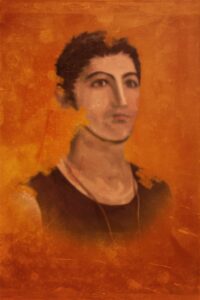
Caius junior: My name is Caius Cuspius Pensa and I’m seventeen. I was born in 62 A.D. in Pompeii, in the region of Campania, just before the earthquake, which destroyed part of the city and robbed me of my mother, who was killed by a falling column. I was brought up by my aunt, Rectina; may the goddess Venus watch over her.
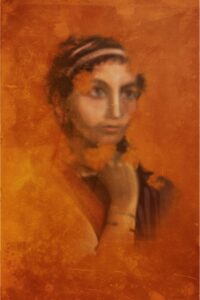
Rectina: I gave Caius the same love and the same upbringing that I gave my own children. I can still see him playing in the middle of the olive groves that I manage, alongside my husband Lucius. Like me, he loves the perfumes that can be made with the oil from green olives.
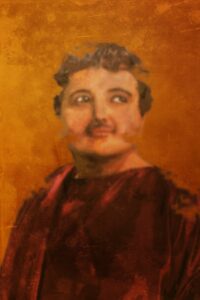
Lucius: I am Lucius, one of the main wine and olive oil merchants in the whole region. I export my wines far across the seas. I’m helping my brother Caius to regain his position as Duumvir by organizing a public banquet with him that will be a truly memorable event.
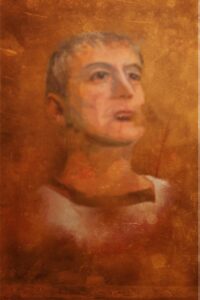
Caius senior: My name is Caius Cuspius Pensa, the name that belonged to my father, and now to my son. I was a Duumvir, one of the two most senior magistrates in Pompeii and I’m seeking to be reappointed at the next elections. In order to achieve this, I am personally financing gladiator fights, banquets and repairs to damaged buildings to please the citizens of my town. I hope that one day my son will succeed me, but for the moment he is passionate about architecture.
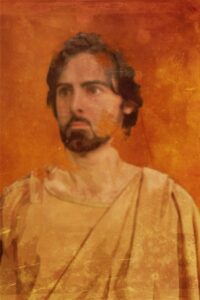
Diphilus: People call me Diphilus. I am a slave and architect in the service of the great Caius Cuspius Pensa. My master has asked me to build new thermal baths in the center of the city, the most modern ever seen.

Hunting ... and the African elephants
Hunting ... and the African elephants
Caius junior: As a child, I loved more than anything else to go hunting with my father and my uncle Lucius. Both were fine horsemen, and my father sat me behind him on his horse. Armed with bows, lances and nets, we hunted wild boar, stags or partridge from sunrise to sunset. Slaves moving forward in a line drove the wild game in our direction by making as much noise as possible, and as night fell, they spread out our hunting tally on the ground before it was then shared out. My uncle always made the same statement on hunting day:
Lucius: – “May the divine Bacchus be thanked at this time for such generosity!”.
Caius junior: But the best memory I have of an animal is without any doubt the day I saw an elephant! My grandfather and my father had, at great expense, overseen the restoration of Pompeii’s amphitheater, which had been partially destroyed. Its public reopening demanded brand new entertainment. In addition to memorable gladiator fights, my father had an elephant brought over from Africa. I had never seen anything like it. A protective net had to be temporarily installed before the frightened inhabitants, of which I was one, were willing to stay in the lower stalls.
Caius senior: – “You know Caius, one of your distant ancestors saw such an animal when fighting Hannibal three hundred years ago!” my father often reminded me. That was, in any case, how the family story was proudly told.

Pompeii, land of wine and olfactory delights
Pompeii, land of wine and olfactory delights
Caius junior: My uncle Lucius owned several villas in the area around Pompeii, most of them being surrounded by vines and olive groves. Large numbers of slaves worked on their upkeep all year round. Lucius produced wine of different qualities. He enjoyed keeping a watchful eye on their fermentation. He also had vines in Falernia which produced the best wine that could be found. He had made his fortune from its reputation. Its grands crus were enjoyed in the finest homes of Pompeii but also in Rome. It appears that even the Emperor Vespasian himself appreciated it in generous quantities.
He exported his wine to numerous countries, as far away as Gaulle or distant Brittany, but those were poorer quality wines because sea-water and lime had to be added to ensure preservation.
My dear aunt Rectina showed a lot of interest in olive oils, especially those used as a basic ingredient for perfumes. She instructed me:
Rectina: – “Look Caius, only green olives must be used, picked well before they are ripe. They provide a neutral oil, which is almost odorless and especially very fluid, not at all viscous. The oil must ‘welcome’ the perfumed essences, and not dilute them”.
Caius junior: I could always smell on her, her favorite perfume: the balm of Judea.

Gladiator's helmet
Gladiator's helmet
Roman citizens loved to watch gladiatorial combat and wild animal hunts.
The ruins of Pompeii tell us a little more about this craze.
For example, many graffiti announcing fights can be seen; and a gladiators’ quarter has been unearthed, as well as a number of pieces of equipment such as the helmet you can see here.
In Pompeii, most of these spectacles took place in the great amphitheatre.
Built on the edge of the city in the 70s B.C., it is one of the largest stone buildings of its kind ever found: it could seat 20,000 spectators!
These fights – free of charge – were organized and financed by town councillors during their term of office, as a way of thanking their electors… or hoping to win new ones.

A banquet to seduce
A banquet to seduce
Caius senior: – “Lucius my brother! I want to throw the citizens of this town a banquet they’ll never forget! To gain voters, there’s nothing better than delicious delicacies!”
Lucius: – “If I am to believe what I have been told, the latest gladiator fights that you organized in the Amphitheater, also did wonders for your reputation”.
Caius senior: – “I am wary of gladiator fights, the passion that surrounds them leads to unfortunate behavior. I still remember the violent clashes between inhabitants of Pompeii and Nocera twenty years ago … several deaths … it’s bad for one’s reputation. Whereas a good meal has never killed anyone!”
Lucius: – “So be it! We’ll bring over large quantities of game and fattened dormice, beef and wild pigs, fruit, berries of all kinds and bread that you’ll talk to me about afterwards, baked with spelt flour… and then the best from the local sea; lobsters, red mullet, sea bass and rays… with garum of course!”
Caius senior: – “And don’t forget the oysters! Pliny the Elder is crazy about them! Choose those that come from Lucrine Lake, they are famous and its proximity means they’ll be fresh!”
Caius junior: Certain oysters produce pearls with a lovely sheen. Their rarity adds great value to any piece of jewelry. My uncle Lucius had offered his wife, my aunt Rectina, a pair of gold earrings, adorned with pearls, that she never took off.

Thermopolium
Thermopolium
Caius Jr: Look, Aunt! A thermopolium! I’m hungry. Could we stop and eat something quickly?
Rectina: Caius, you know very well that they only serve simple, unrefined dishes here, for the common people, or even for brigands. You won’t find any stuffed boars here like we have at our table!
Caius Jr: Of course, but it’s fun to eat standing up, in the street.
Rectina: Alright, fine. But just this once! What do you want to eat?
Caius Jr: Look, they have snails and beans! And they have herbal infusions with honey!

A feast before the end
A feast before the end
Caius junior: It was glorious weather that day, as early summer often can be in Campania. Hundreds of guests were enjoying the courses served one after another at regular intervals, creating the impression of a feast that would never end. My father, surrounded by the city’s highest dignitaries, including Pliny, was talking loudly and recounting his exploits:
Caius senior: – “I’ve been working to rebuild this city for over fifteen years now. And as further proof, the thermal baths in the city center will soon be open to you and everyone else! You know how much I love our city! May Venus and Apollo watch over us and may Bacchus delight us again this day!”
Caius junior: The applause that followed seemed to indicate that the following elections next March would be a mere formality. But only a few days later, the first tremors began. Vesuvius had decided otherwise.

Folding tripod
Folding tripod
This magnificent bronze tripod is undoubtedly a … religious object. Or at least, it was used in religious ceremonies. As it can be folded, it could be transported to places of worship. It was designed to hold a hearth – for incense – or a basin – for wine. Incense was the vehicle for transmitting human offerings to the gods.
Roman religion is characterized by its polytheism and, above all, by its absence of dogma. It is characterized by a set of rites that must be performed as correctly as possible to satisfy the gods.

Amphoras and men: The hazards of the wine trade
Amphoras and men: The hazards of the wine trade
Caius junior: The loading of the amphoras, in the holds of the departing ships, had to be very meticulous. My uncle Lucius always supervised this delicate operation, which ensured that the amphoras would arrive intact at their destination. Providing, of course, that the ship itself reached its destination. Storms in the Mediterranean could be both sudden and terrifying. I remember Lucius running into my father’s domus one day and shouting:
Lucius : – “An entire cargo! Sunk! Smashed by the storm off the coast of Hispania!”
Caius junior: Such a tragedy could lead to a serious change of fortune. Fortunately, aboard this sunken vessel, my uncle only had a few dozen amphoras of wine that was undoubtedly mediocre. The day of the banquet being hosted by our family was drawing near in this early summer of ’79. Who would have thought then that it would be Pompeii’s final public feast …?
Caius senior: – “I want Pliny the Elder to talk about our banquet as far away as Rome, Lucius. He’s a great wine enthusiast, do you have any of that famous Falernian wine left – the one that you let me try?”
Lucius: – “No, that one’s run out, but the vintage of ’74 was superior in every way. Believe me, Pliny will be delighted! »

Rhyton
Rhyton
The rhyton is a horn-shaped drinking vessel, sometimes referred to as a Dionysian horn.
The larger orifice was used to pour the liquid through the terminal hole. Several frescoes show its use during symposia (banquets). This object bears witness to the fact that the Romans of the time had mastered the art of glassblowing. So much so, in fact, that by the time of the catastrophe, the use of glass tableware had become widespread, and more glass vases than ceramics, for example, are to be found in the ruins. Pompeian glassmakers also mastered the art of color, adding cobalt to glass paste to obtain dark blues, copper for greens and manganese for purples.

A city under reconstruction
A city under reconstruction
Caius junior: The earthquake of 62 A.D. caused very significant damage. When I was very young, I went with my father to the home of his friend Jucundus, the banker. I was fascinated by a bas-relief, which showed the chaos caused by this unbelievably violent tremor. I thought, with my childish imagination, that I would find the lifeless corpse of my mother depicted there. Rebuilding was essential. Over the years that followed, my grandfather and my father financed a good number of restoration projects including that of Pompeii’s amphitheater. The creaking of cranes, with men walking inside, became familiar. Everywhere we came across workmen handling set-squares and plumb-lines, calibers and compasses. I grew up in this environment, following our architect slave, Diphilus, around the work sites at every opportunity. In this way a passion for architecture stirred in me. One day, when I was seventeen, my father summoned Diphilus:
Caius senior: – “Diphilus! I want to have new thermal baths built for the public in the center of the city on that abandoned plot of land. Raze the remaining ruins to the ground and draw up architectural plans for me that will be the talk of the town. The baths will need to open before the elections next March. My son Caius will monitor progress on the site. I expect your first draft within two weeks! Get going!”
Caius junior: Diphilus began work on the project immediately. He reported to me on a daily basis.
Diphilus: – “Master, we could build it entirely out of bricks. Time is of the essence and public baths have never been built using only this material. And thanks to new techniques using glass windows, we can make large openings to benefit from the sun!”
Caius junior: My father accepted the plans. We also decided that these thermal baths would become the only ones in Pompeii to be mixed, as had recently become the trend. In this way, men and women could bathe together.

The light of glass, the warmth of hollow brick
The light of glass, the warmth of hollow brick
Caius junior: My father wanted the thermal baths in the city center to be the most welcoming and comfortable they could be. And above all, to regain his position as Duumvir, he wanted the local citizens to show him their gratitude. He was not a man who lacked elegance. His toga was always impeccable and his fine chiseled features added to his distinction.
Diphilus: – “To heat the warm rooms and the baths, Master, we intend to use tubulas in the walls in addition to the traditional hypocaust heating. Cluatius, an architect friend, has already used these hollow bricks for thermal baths on the coast at Herculanum”.
Caius junior: The principle was simple. Fireplaces situated outside the building were kept hot by slaves and sent warm air under the floor that was raised up on small terracotta pillars. The hot air then rose through the tubulas, hollow bricks from which the walls were made. In this way a comfortable or hot temperature was guaranteed all year round. But of all the techniques I found the use of glass particularly fascinating. My aunt Rectina had an impressive collection of vials for ointments, oil, and small bottles for her perfumes, all of them in different shapes and sizes.
Rectina : – “Caius! Put that vial down immediately! Gently, please…”
Caius junior: She was goodness itself and was very forgiving when I was small, but her glass vials were strictly off-limits. It is true that one of her small glass vials contained her favorite perfume, the most expensive of all: the balm of Judah, extracted from the sap of a particular tree. She told me one day that a single vial of this precious balm was worth 200 denarii. Such as sum represented more than a hundred days’ wages for a farm laborer!

Lares
Lares
These statuettes represent lares performing a dance step. The lares were the tutelary deities of the household, protectors of the family. They are the most authentic testimony to popular religiosity.
In their hands, they hold a drinking horn (rhyton) and a patera, a shallow, flared bowl used to offer libations.

Snake-head bracelet
Snake-head bracelet
This snake-head bracelet is made of gold and seems to have been an appreciated gift! A similar bracelet was found in the ruins of Pompeii, with the following message engraved on the inside: “Dominus suae ancillae”. This could be translated as: “From a master to his slave”. Presumably, this slave was more than just a “simple” slave to his master !
In addition to the snake’s easy transformation into a bracelet or ring, this animal is often depicted in jewelry because it is the pet of Aesculapius (Greco-Roman god of medicine), protector of health and considered an emblem of immortality.

The construction of the Central Baths and Roman hydraulic engineering
The construction of the Central Baths and Roman hydraulic engineering
Caius junior: The building of the thermal baths in the city center was progressing quickly under the summer sun. The central bath in the ‘natatio’ had now been dug and the different areas were taking shape: the frigidarium with its cold-water bath, the tepidarium, a warm room in which lively discussions took place, the laconicum, a sauna room and lastly the caldarium with its hot water bath. There would also be latrines for everyone’s convenience. A large rectangular palestra would be available for physical exercise before bathing. Diphilus came to warn me about a serious problem.
Diphilus: – “Master, we need a significant amount of water to fill the baths, if the aqueduct is not functional, we’ll never manage.”
Caius junior: There was another tremor, but only a mild one. Fissures had reappeared along the aqueduct that was supposed to supply the city and water was leaking out. My father decided to secure the situation immediately. Perhaps Diphilus and I would have to dig a vertical well to reach the water in the phreatic table with the help of a noria, a large wheel with buckets attached? There was no way that the public baths could be short of water! For the daily needs of the city’s twelve thousand inhabitants, there were wells everywhere and each domus was equipped with a rainwater cistern, collecting rain from the roof, which was enough for a family and their slaves. The most well-to-do upper class, to which my father belonged, even owned a bath and their gardens were irrigated by an impressive network of valves and pipework.

Brazier
Brazier
This type of brazier was generally composed of two parts. In the bronze support shown here, an iron vessel filled with amphora shards was placed to keep the heat in. While large villas were equipped with underfloor central heating systems, most houses had to do with braziers in the living rooms.
An exceptional object, as it is in itself a typical Pompeian visual pun. It had in fact been donated to the thermal baths by a certain Marcus Nigidius Vaccula. Vaccula means cow, hence the cow in the center.

Impluvium
Impluvium
Delphius: I won’t have any trouble bringing water to the new baths I have to build because we’ve always considered water a rare and precious resource. Thus, in the houses of the city, the atrium is one of the main rooms. It often serves as a public room where the masters receive guests. Portraits of the current occupants or their ancestors often decorate it. But above all, the roof of this room is open in the center, allowing rainwater to flow into a basin, the impluvium. The water is then collected in a cistern and used when rainfall is scarce, for example to maintain the gardens.

Prisms and stained glass: The magic of glass
Prisms and stained glass: The magic of glass
Diphilus: – “Thanks to the glass window, we can design openings that are three feet across, Master. During the day, there will be no need to use lamps or lanterns. The shafts of sunlight will dance on the surface of the water and send reflections all across the walls!”
Caius junior: My interest in glass took on a new dimension. Specular stones brought from Hispania were not suitable for large windows, but the translucid glass certainly was. We had, of course, planned to use a number of oil lamps, lanterns and candelabras so that the women would see a lovely reflection in their mirrors on those evenings when the sun set earlier. This image of the reflections dancing on the walls reminded me of a few years earlier when I had been playing with my aunt Rectina’s mirror. I even recalled one birthday and the surprise gift she offered me.
Rectina: – “Do you know what this is, Caius? It’s a glass prism. Go outside and let the light of the sun shine through it. Then come back and tell me what you have seen…”.
Caius junior: I rushed outside and thanked Apollo that it was such a fine day. The prism shone colors on the ground that went from red to violet, similar to those of the rainbow after the June storms. As soon as the sundial in the house showed a clear shadow, I would try every glass object, hoping for the same result, including the colored sticks that Rectina used for her precious scented potions.

Measures and weights
Measures and weights
Caius junior: The streets of Pompeii were lined with shops and boutiques of every kind. From these shopfronts wafted the smells of spices or flowers, which were among the nicest, but also fish or garum which caused you to pick up your pace. One shop was selling fabric made from linen, cotton or wool, another was offering sandals smelling of new leather. Over here, grain was being weighed, in small amounts or by the sack, over there a length of material was being measured in feet. Each stall holder tried to attract customers by singing the praises of his merchandise which was of course the most beautiful, the freshest or the cheapest.
Rectina: – “I would like a setier of rose perfume from Campania …”
Caius junior: This perfume cost 6 denarii per setier, in other words three quarters of a litre. Rectina insisted that the measurement should be made in calibrated glass containers. It was the safest way to not be tricked over the quantities involved. My aunt Rectina, as with other women of substance, managed many aspects of my uncle Lucius’ activities and in fact he encouraged it. But this was not the case everywhere. Roman women, although enjoying a certain freedom, were for the most part dependent on the good will of their fathers or husbands. When it will be time for me to marry, I will follow the example of my aunt and uncle.

Scales
Scales
This type of beam scale was widely used in Pompeii.
One of the hooks is used to suspend the scale, while the other, at the end of a small chain, holds the goods.
The beam is graduated.
Weighing is performed by sliding the weight until the beam is balanced.
Here, the weight is a chubby child’s head, which could represent
the infant god Mercury. Mercury was considered the protector of commerce in the Roman world.
Merchants using these scales were often criticized for using fake weights and scales.
So much so, in fact, that they were accused of acting out of fraus et lucrum (fraud and greed). That’s why all the major Roman cities had officials in charge of checking weights and scales.

Sundial
Sundial
The hole in the upper part of this marble sundial would have housed the gnomon, a metal rod (usually bronze) whose shadow projected onto the graduations was used to measure time. Thirty sundials of this type have been found in Pompeii, in both private and public gardens. It’s a rudimentary way of telling the time during the day, but not a very accurate one. As Seneca wrote, “it is easier to make two philosophers agree than two clocks”.

Pompeii, immortal city
Pompeii, immortal city
Caius junior: A few months after those terrible days, I returned to Pompeii to see what I might find. Monuments that I knew well protruded from the compact mass of ash, and I was able to locate my father’s domus. Digging around that spot, I found only a few objects, nothing more. No doubt he had fled the house. I stayed there a long time, motionless, in the total silence, my eyes closed. I seemed to hear the voices of those I loved, and a smile came to my lips. In that moment I felt with certainty that one day, we would meet again.
